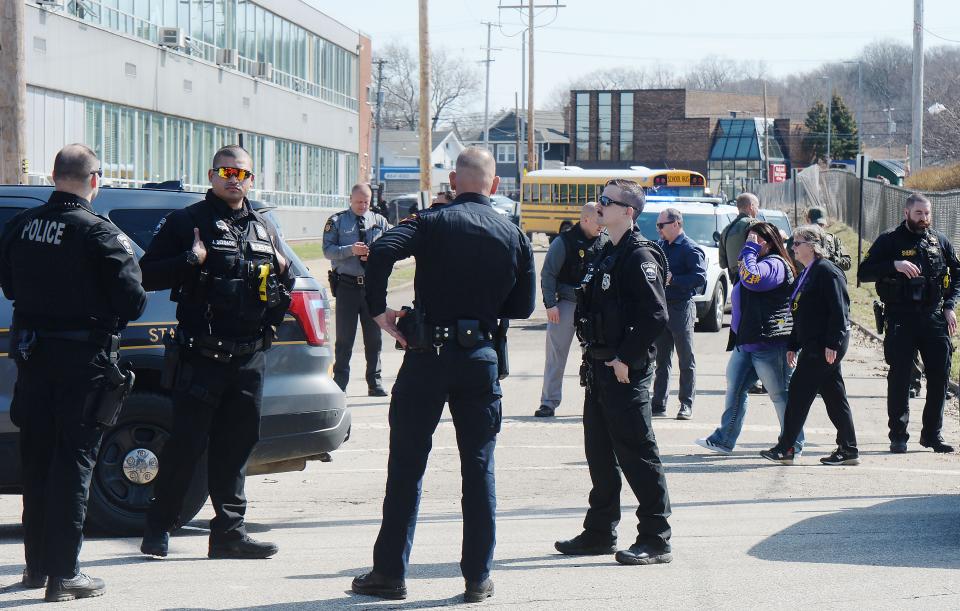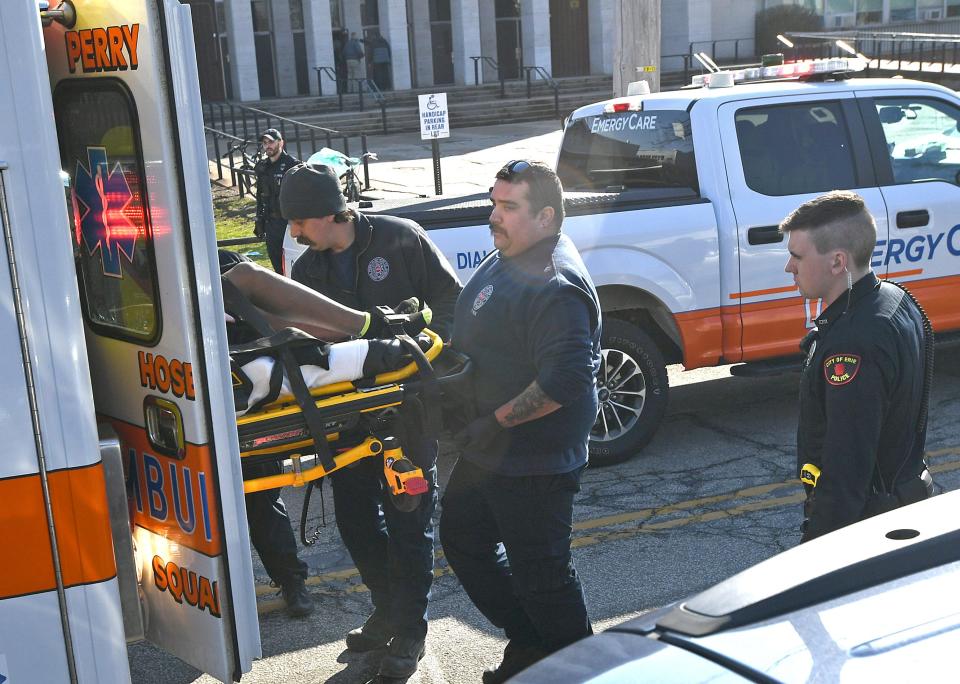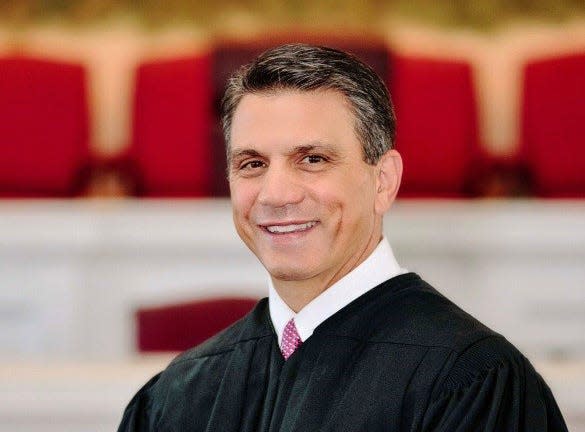DA seeks to transfer 14-year-old's case to adult court in Erie High School shooting
Though he is charged as a juvenile, the 14-year-old boy accused in the Erie High School shooting could still be prosecuted as an adult.
The Erie County District Attorney's Office is asking a judge to transfer the case from juvenile court to adult criminal court.
The teen defendant would face the possibility of spending decades in prison if convicted as an adult of the felonies of attempted homicide, aggravated assault and other offenses in the April 5 incident, in which another student was shot and injured in a hallway at about 9:20 a.m. at Erie High, 3325 Cherry St.
Timeline:Erie High shooting suspect in custody: How the events unfolded since Tuesday
District Attorney Elizabeth Hirz on April 14 filed a motion requesting the transfer. Judge John J. Trucilla, the administrative judge for juvenile court in Erie County, signed what's called a rule-to-show-cause order on the motion on Tuesday, a move that sets up Hirz's request for a hearing at a later date before Trucilla. He will hear evidence to decide whether to transfer the case from juvenile court to criminal court.

The Erie police charged the 14-year-old as a juvenile because Pennsylvania law prevents the filing of adult criminal charges in certain cases of violent crime against defendants younger than 15. The exception is if the case involves a homicide, in which charges can be filed against a defendant younger than 15.
The threshold age for non-homicide violent crimes is set under the Fisher Bill, or Act 33, effective in 1996, which allows police to file adult criminal charges against juveniles at least 15 years old. In Fisher Bill cases, the defendant can seek to transfer the case from criminal court to juvenile court, but the case starts in criminal court.
Initial report:DA: Suspect in Erie High shooting is under 15, faces juvenile charges
As Hirz explained the day of the Erie High shooting, the police had no choice, under the Fisher Bill, to file only juvenile charges against the defendant because of his age.
However, Hirz is moving to transfer the Erie High case to criminal court under another state law, the Juvenile Act, which governs the transfer of juvenile cases to criminal court.
Safety effort:From call-ins to metal detectors, district forms plan to recover from Erie High shooting
The Juvenile Act allows the prosecution to seek a transfer if the juvenile defendant is at least 14 years old and —among other criteria — the charge against the defendant would be a felony if the juvenile were convicted as an adult. Under Section 6355 of the Juvenile Act, the prosecution can seek a transfer from juvenile court to criminal court, but the case starts in juvenile court.
"Because we are prohibited by the Fisher Bill to charge him as an adult, we are asking the court to transfer the case from juvenile court to adult court," Hirz told the Erie Times-News.
The defense can oppose the motion and ask that the case stay in juvenile court. One of the defense lawyers on the case, Chad Vilushis, could not be immediately reached for comment.
A rare request
Such transfer requests have been rare in Erie County Common Pleas Court, as most juvenile defendants charged with violent crimes, other than homicide, have been 15 years old or older.
In the Erie High case, the 14-year-old defendant turned himself into Erie police the day after the shooting and is in custody at Erie County's Edmund L. Thomas Adolescent Center, a secure facility on the campus of the former Pleasant Ridge Manor East in Millcreek Township.
His first hearing in juvenile court was on April 8, a detention hearing before what is known as a juvenile master, a lawyer who presides over the initial hearings in juvenile cases and reports to Trucilla.
In custody:Erie High shooting suspect turns self in, placed in juvenile detention
Under an agreement with the prosecution and defense, the master, Carrie Munsee, kept the defendant in the Edmund L. Thomas Adolescent Center. The defense could have requested release on electronic monitoring or house arrest.
If the case were to remain in juvenile court, it would eventually go to an adjudication hearing, similar to a trial, where the defendant could admit to the charges or a judge could dismiss the case or find that the defendant has committed a delinquent act, similar to a conviction of an adult in criminal court. If found delinquent, the defendant would then go before a judge for a dispositional hearing, similar to a sentencing in criminal court.
If found to be delinquent, the defendant could be placed under juvenile supervision, including at a secure facility for juveniles, until he turns 21. The defendant turns 15 in June, according to information presented at the detention hearing, to which the Erie Times-News was granted access. The defense at the hearing indicated the shooting might be linked to feuding juveniles.
Detention hearing:Defendant in Erie High shooting is 14; at hearing, lawyer links case to feuding juveniles
If the defendant's case were transferred to criminal court, and he were convicted and sentenced to incarceration, he would go to the Erie County Prison, or, if the sentence were at least two years, to state prison. In addition to facing the felony charges of attempted homicide and aggravated assault, the defendant is charged with offenses including reckless endangerment, carrying a firearm without a license, possession of a firearm as a minor and possession of a weapon on school property, the police said.
As a first-degree felony, attempted homicide carries a maximum sentence of 20 years.

The defendant is accused of firing a 9mm pistol at least five times, hitting the victim three times, based on the number of shell casings collected at the scene, police said.
The authorities have not identified the victim, but said he was shot in the abdomen and leg area and did not suffer life-threatening injuries. The Erie Times-News is not identifying the 14-year-old defendant because he remains charged as a juvenile.
Judge must weigh shooting's impact
As the prosecution's request for a transfer to criminal court proceeds, Hirz said she is limited as to what she can say at this point because the case remains in juvenile court, where public access to filings and other information is restricted in many respects because of the defendants' age. At the hearing before Trucilla, the District Attorney's Office "will set forth evidence that we feel warrants the transfer of this case to adult court," Hirz said.
Juveniles charged as adults:Juvenile detention or adult prison? New federal law lets Erie County judges decide
Under Section 6355 of the Juvenile Act, the judge at a transfer hearing must find that a number of factors exist in order to send the case to criminal court. Those factors range from the objective, such as whether the juvenile charge against the defendant would be a felony in criminal court, to the more subjective, such as whether the offense had a significant impact on the community.

According to Section 6355 of the Juvenile Act, for a transfer to occur, the judge must find "that there are reasonable grounds to believe that the public interest is best served by the transfer of the case for criminal prosecution." In determining whether the public interest can be served, according to the law, the judge "shall consider" a number of factors. They include:
"The impact of the offense on the victim or victims.
"The impact of the offense on the community.
"The threat to the safety of the public or any individual posed by the child.
"The nature and circumstances of the offense allegedly committed by the child."
The law also requires the judge to consider "whether the child is amenable to treatment, supervision or rehabilitation as a juvenile." The factors the judge must consider in making that determination, according to the law, include the defendant's age, mental capacity, criminal sophistication and prior record, if any.
Another juvenile case:56 gunshots put Erie 16-year-old in county prison in attempted homicide case
At the transfer hearing, the defense would be expected to focus on the defendant's age and amenability to treatment in the juvenile system, among other factors. The District Attorney's Office would be expected to focus on the nature of the shooting — including that it happened in a school — and the effect of the shooting on the community.
The shooting immediately forced a lockdown of the 500,000-square-foot Erie High and its 1,440 students who attend in-person classes in the building, the largest school in the Erie School District, which has more than 10,000 students.
The shooting also prompted the Erie School District to cancel classes at Erie High for the rest of that week, and it led the district to launch a plan to make around $1 million in security upgrades, mainly at Erie High. As part of the plan, the district this week installed metal detectors at its three middle schools and its other high school, Northwest Pennsylvania Collegiate Academy.
Different return:In response to Erie High shooting, students return from spring break to metal detectors
The students at those schools returned from spring break on Tuesday. Erie High students started virtual classes on Wednesday and are scheduled to return to in-person classes on May 2. The remote learning is designed to give the school district enough time to make all the security changes at Erie High, including the introduction of metal detectors, before students return on May 2.
More violence:Erie police review video, praise witness help in fatal shooting probe of 7-year-old
Erie High and the other schools had no metal detectors, though the district administration since January had considered installing them due to the spike in violence among juveniles in Erie during the pandemic. The district had used security wands on Erie High students who arrived late to school and had used the wands to check Erie High students at random.
Contact Ed Palattella at epalattella@timesnews.com. Follow him on Twitter @ETNpalattella.
This article originally appeared on Erie Times-News: Erie High shooting: DA seeks to transfer case out of juvenile court

